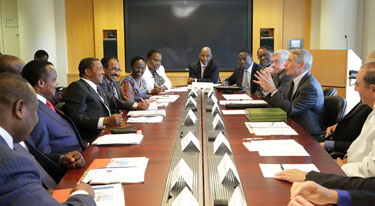US-Africa summit encourages investments in health
September / October 2014 | Volume 13, Issue 5
Health was on the agenda as leaders from nearly 50 countries gathered in Washington in early August for the first-ever US-Africa Leaders Summit, intended to expand trade and investment, encourage sustainable development and enhance cooperation on peace and security.
NIH Director Dr. Francis S. Collins participated in one of the sessions, titled "Investing in Health: Investing in Africa's Future." U.S. Secretary of Health and Human Services Sylvia Burwell opened the program noting "Africa is on the rise" and that public health is the anchor of economic health and individual well-being, in Africa and elsewhere. During the 90-minute conversation, participants discussed global health security, HIV/AIDS prevention and treatment, and maternal and child health. Collins led the portion devoted to examining how biomedical research can accelerate treatment advances.

Photo by Bill Branson/NIH
NIH Director Dr. Francis Collins (far right), Fogarty
Director Dr. Roger Glass (far left) and National
Heart, Lung and Blood Institute Director Dr. Gary
Gibbons (second left) welcomed Tanzanian President
Jakaya Kikwete (center right) and his delegation.
African nations should strengthen training opportunities for their scientists and develop stable career paths to lessen the "brain drain" from their countries, Collins urged. He also encouraged leaders to consider their nation's long-term needs in terms of the scientific expertise required to conduct research on critical health issues to protect their populations from health threats.
Before and after the official summit, Collins hosted a number of African leaders and delegations at the NIH campus for discussions with the agency's top scientists and tours of the Clinical Center. Representatives from the Republic of the Congo, Kenya, Mali, Tanzania and Zambia took part in conversations on how best to collaborate to improve health across Africa.
"Investing in health is not only the right thing to do, to reduce suffering from disease. It also results in economic returns," Collins told his visitors. The NIH currently supports research and training across the African continent through about 1,500 grants, representing a significant portion of its international activities. Since Africa is home to seven of the world's 10 most rapidly growing economies, "this seems like a great opportunity to talk about the potential to go even further in making investments in biomedical research," Collins said.
Tanzanian President Jakaya Kikwete agreed investing in medical research is a high priority. "We're all thinking about the importance of research in my country," he said. Partnerships that help build capacity, such as with NIH, "are crucial," he added.

Photo by Bill Branson/NIH
NIAID director Dr. Tony Fauci (right) discussed vaccine
development and other ongoing infectious disease research
with African leaders.
Infectious disease research advances - including an update on Ebola vaccine research - were presented by Dr. Anthony Fauci, director of the National Institute of Allergy and Infectious Diseases (NIAID).
"Obviously, we are concerned about Ebola, and it is a grave situation with malaria and HIV as well," said Congolese President Denis Sassou Nguesso. "We have a lot of challenges and need partners such as you."
The group also agreed there is an urgent need to address the most rapidly growing health problems in Africa, including heart disease, diabetes, cancer and other noncommunicable diseases (NCDs).
In Kenya, cancer is now the second biggest killer, according to its Health Secretary, James Macharia. New annual diagnoses number 70,000, and other NDCs are on the rise, "but we don't have the capacity to treat these diseases," he said. Kenya has only 12 oncologists and a population of 43 million. Several other leaders reported similar shortcomings in their countries and mentioned the high cost of sending patients to South Africa or India for treatment.

Photo by Bill Branson/NIH
Malian President Ibrahim Boubacar Keïta was one
of several heads of state who visited NIH during the
first-ever US-Africa Leaders Summit.
Collins assured the group that NIH is committed to helping them make the shift from a strong focus on infectious diseases to NCDs. Other senior NIH officials suggested promising research and training opportunities. Dr. Gary Gibbons, Director of the National Health, Lung and Blood Institute (NHLBI), said genomics studies in Africa are important not only to local populations but also to African Americans, who can share genetic variations that cause illnesses such as sickle cell disease.
Reducing mother-to-child transmission of HIV and improving newborn care are two ways research is lowering child mortality in Africa, said Dr. Alan Guttmacher, director of the National Institute of Child Health and Human Development (NICHD).
Cancer is another topic that can benefit from research collaborations, said National Cancer Institute (NCI) Deputy Director Dr. Douglas Lowy. He cited the development of Zambia's acetic acid screening for cervical cancer as a successful example, but said research is needed to develop earlier screening methods and strengthen data collection.
Finally, African scientists can benefit from training and mentorship through the NIH Medical Research Scholars Program, said Clinical Center Director Dr. John Gallin.
Investments must also be made to ensure well-trained investigators are retained in their home countries, observed Fogarty Director Dr. Roger I. Glass. "Young investigators are an important resource that needs to be cultivated so that they grow into scientific leaders who can identify and advance the local research agenda."
More Information
To view Adobe PDF files,
download current, free accessible plug-ins from Adobe's website.